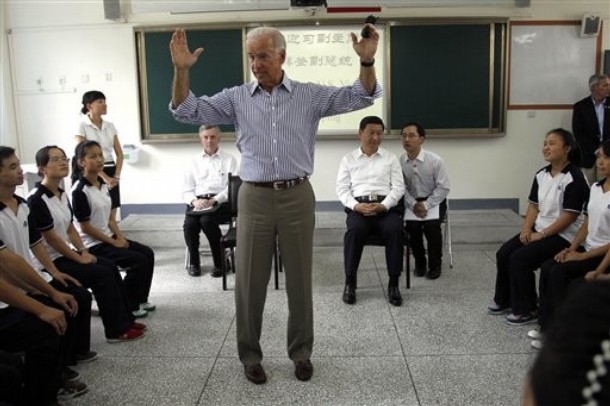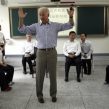
Xi Jinping: China’s Conservative Strongman-in-Waiting
Publication: China Brief Volume: 11 Issue: 16

The world caught a rare glimpse of Chinese Vice President Xi Jinping during U.S. Vice President Joe Biden’s five-day visit to China last month. Xi is due to succeed Hu Jintao as General Secretary of the Chinese Communist Party (CCP) at its 18th Congress in October 2012, and state president soon afterwards. In an apparent attempt to let the global media know more about himself, Xi took the unusual step of accompanying Biden on a side trip to Sichuan Province in western China. While the 58-year-old “princeling”—a reference to the offspring of party elders—did not say anything earth-shattering during Biden’s tour, Xi confirmed earlier impressions of being a conservative who is a fervent believer in many aspects of Chairman Mao Zedong’s teachings. Moreover, his strong ties to the “princeling generals” in the People’s Liberation Army (PLA) may predispose him toward seeking a hawkish foreign policy, or at least support the PLA’s organizational interests.
According to senior aides traveling with Biden, Xi, who is also Vice Chairman of the policy-setting Central Military Commission (CMC), was “very confident, very assured” in his dealing with American officials. “Xi did not refer to notes [when talking to Biden],” one official said. “He had a very clear idea of what he wanted to convey… very strategic in his approach, quite confident in his interaction with his colleagues” (Wall Street Journal, August 18; Ming Pao [Hong Kong] August 19). Part of Xi’s confidence and sophistication has emerged through having a better grasp on world affairs, especially China-U.S. relations. During his trip to Mexico in early 2009, Xi made headlines when he appeared to have scolded the United States in a talk to representatives of the Chinese community in Mexico City. “There are some foreigners with full bellies who have nothing better to do than pointing fingers at our country,” Xi said. “China does not export revolution, hunger and poverty, nor does China cause you any headaches. Just what else do you want?” (The Telegraph [London], February 16, 2009; Chinadigitaltimes.net [San Francisco], February 17, 2009). Footage of Xi’s fulmination, which was broadcast in Hong Kong, was banned on mainland Chinese television.
Xi sounded a lot more statesmanlike in his tête-à-tête with Biden. The Chinese Vice President indicated both countries should “ceaselessly boost Sino-American strategic mutual trust.” Xi continued “Both sides should objectively and rationally look at each other’s development and make correct judgments on the each other’s strategic intentions.” Even more significant is that fact that Xi appeared to give a vote of confidence to the American economy. “The U.S. economy is highly resilient and has a strong capacity to repair itself,” he said in a forum of Chinese and American businessmen. “We believe that the U.S. economy will achieve even better development as it rises to challenges” (Xinhua, August 18; People’s Daily, August 19; Asia Times [Hong Kong], August 23). This was in sharp contrast to the scores of commentaries in the official Chinese media that expressed a lack of confidence in the Barack Obama administration’s ability to pull the U.S. out of the current debt and financial crises.
Tell-tale signals, however, seem to betray Xi’s less-than-enthusiastic proclivities toward the United States. Before Biden’s arrival in Chengdu, capital of Sichuan Province, a dozen-odd dissidents were either detained briefly or given severe warnings not to try to present any petitions to the American VIP. Xi was nowhere to be found during Biden’s speech at Sichuan University in which the veteran U.S. politician made a pitch for “openness, free exchange of ideas, free enterprise and liberty” (Los Angeles Times, August 21; Radio Free Asia, August 21). Xi did accompany Biden to Qingchengshan High School, which had been newly reconstructed after the horrendous 2008 Sichuan Earthquake. However, while Biden engaged in a spirited pep talk with the students, Xi, who was sitting nearby, did not seem to be paying much attention to his guest. He frequently was looking in a different direction and appeared to be either bored or lost in thought (New York Times, August 21; Radio Free Asia, August 24).
According to People’s University (renmin daxue) foreign affairs specialist Shi Yinhong, Xi was being particularly cautious because of his status of leader-in-waiting. “Xi has his own personality,” said Professor Shi, “when he has become the highest leader at the 18th Party Congress, his personality will show through in a more conspicuous manner” (Ming Pao, August 23; Oriental Daily News [Hong Kong] August 23). The Chinese vice president, however, demonstrated some strongly held convictions in his remarkable talk to the students at Qingchengshan High School. “The world is yours and it is also ours; but ultimately, the world belongs to you,” he said, “Young people are like the sun at eight or nine in the morning. The future rests with you.” Xi was repeating verbatim what Chairman Mao told a group of Chinese students at Moscow University when he visited the Soviet Union in 1957 (Sina.com [Beijing], August 21; Wen Wei Po [Hong Kong], August 21).
While there is no evidence to suggest that Xi deliberately used Mao’s famous Moscow speech to embarrass his guest, there is little doubt that China’s Fifth Generation leader is an ardent believer in many aspects of Maoism. Together with another high-profile princeling, Chongqing Party Secretary Bo Xilai, Xi has been responsible for a far-reaching restitution of Maoist norms in the past two years. (See “The CCP’s Disturbing Revival of Maoism,” China Brief, November 19, 2009). For example, at a seminal address to students at the CCP Central Party School earlier this year, Xi urged students to “pay attention to the Marxist canon,” especially Mao’s classics. “Cadres must seriously study Marxist theory to ensure that they can maintain political resoluteness,” he said. Xi added that since Marxist classics were voluminous, “we should focus on the salient points, and concentrate on studying the quintessence—particularly the important works of Mao Zedong” (People’s Daily, May 13; Sina.com, May 13).
Conservative—and hawkish—elements in the party and the PLA have been resurrecting a number of the Great Helmsman’s dictums on foreign and military affairs to justify the country’s new-found assertiveness on the diplomatic front. Hard-line theorists have heaped high praise on the Great Helmsman’s so-called “three major dictums,” which he put forward in the heady months before October 1, 1949. They were, one, “setting up a separate stove;” two, “put our house in order before inviting guests;” and, three, “one-sidedly favoring [the Soviet Union]”. According to Zhang Baijia, Deputy Director of the CCP Research Office of Party History, the first two principles “enabled new China to seize the strategic initiative in foreign affairs” by “banishing the influence and impact of imperialism in China.” The third precept, Zhang added, “enabled China to join the international pacifist camp” (Xinhua, June 13; China News Service, June 13). Popular media commentator Major General Luo Yuan praised Mao for daring to confront the “American imperialists” by entering the Korean War in 1950. Mao’s decision, Luo said, “has served as an inspiration for the Chinese race as well as for all the suppressed peoples in the world.” For Major General Zhang Zhaozhong, who thinks that “Mao Thought is very correct,” the late chairman’s pugilistic policies toward the West worked much better than the “tao guang yang hui” stance of “keeping a low profile and never taking the lead” (Club.china.com [Beijing], June, 20, 2010; Wyzxsx.com [Beijing], October 6, 2010). “Tao guang yang hui” refers to the largely conciliatory policy which Deng Xiaoping laid down in the early 1990s so as to improve relations with the U.S. and Europe.
Vice President Xi has never gone on the record on whether he shares Mao’s hard-line policies toward the U.S. Yet he has spoken highly of such Maoist dictums as pingzhan heyi, or “the synthesis of [the needs of] peacetime and war.” This means a more extensive program of training reservists and that civilian resources and facilities should be used for military purposes in times of war. Moreover, it is significant that the PLA being an important power base of the supremo-in-waiting, Xi has lent his support to the no-holds-barred modernization of military hardware. (See “PLA Gains Clout: Xi Jinping Elevated to CMC Vice-Chairman,” China Brief, October 22, 2010). Indeed, a good part of the confidence with which Xi has impressed the Biden delegation may have sprung from the fact that the vice president’s fellow princelings have become arguably the largest faction within the military establishment, compared to, for instance, officers who still profess allegiance to President Hu.
Generals with illustrious “revolutionary bloodline” who are tipped to either remain—or be inducted into—the CMC to be restructured at the 18th Party Congress include the following senior officers. Current Air Force Commander Xu Qiliang (son of the late Air Force Lieutenant General Xu Lefu), is expected to be appointed one of the CMC Vice-chairmen at the 18th Congress. Deputy Chief of the General Staff Ma Xiaotian (son of Ma Zaiyao, former provost of the Political Institute of the PLA), may be promoted Air Force Commander. Two princelings also have become candidates for the key slot of Director of the General Political Department, which controls personnel and ideological matters. They are General Logistics Department Political Commissar Liu Yuan, 60, (son of state president Liu Shaoqi) and Chengdu Military Region Political Commissar Zhang Haiyang, 62, (son of Long March generation General Zhang Zhen). Both Liu and Zhang are considered Xi’s cronies. Finally, Shenyang Military Region commander Zhang Youxia (son of Gen Zhang Zongwun, who was among the first batch of generals after the founding of the People’s Republic of China), may be promoted Director of the General Armament Department next year (South China Morning Post, August 5; Apple Daily [Hong Kong], August 24; Wen Wei Po, August 3).
Several of these prominent princeling officers, including Ma Xiaotian, Liu Yuan, Zhang Haiyang and Zhang Youxia, only became full generals in the past three years. Since Xi became CMC Vice Chairman last year, he has maneuvered to elevate the political fortunes of the princeling generals. For example, General Liu Yuan was earlier this year transferred from the post of Political Commissar of the Academy of Military Sciences to the much more strategic slot of Political Commissar of the General Logistics Department (Xinhua, July 23). The possibilities are high that to quickly consolidate his power base after the 18th Party Congress, Xi may unreservedly back the generals’ ambitious goals of global hard-power projection. This could intensify already ferocious competition between China and the U.S. in theaters such as the Asia-Pacific Region.





